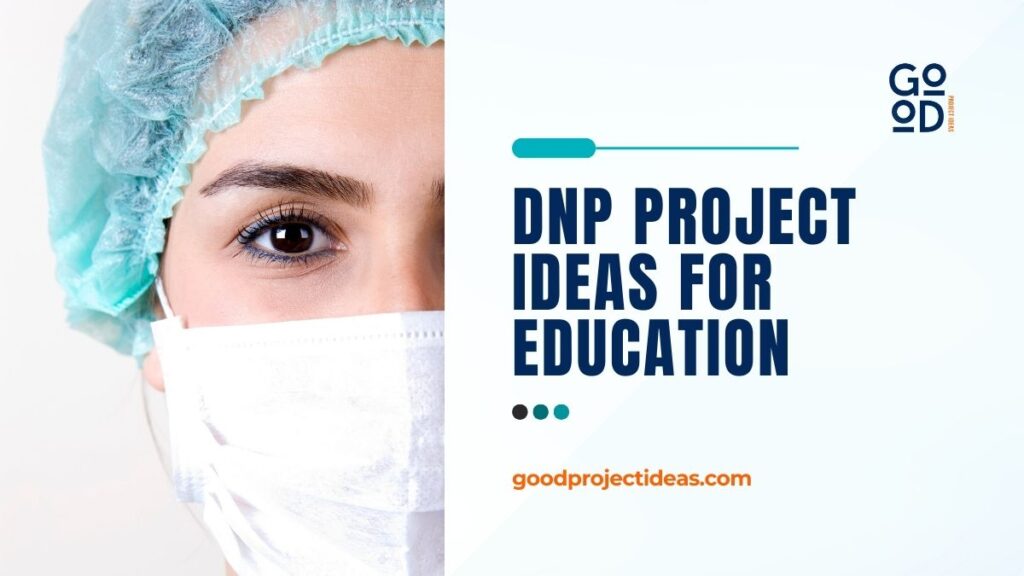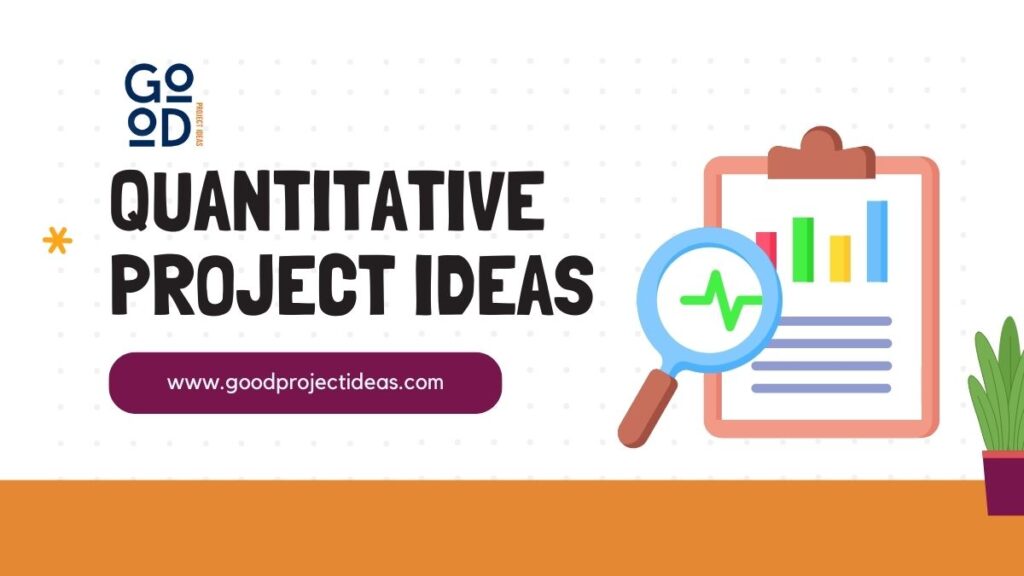Explore impactful DNP project ideas for nursing education. Inspire change and enhance learning outcomes with these tailored suggestions. Start your journey towards transforming nursing education today!
Planning a DNP project in education? Exciting! Your DNP journey in education is a chance to make a real impact. Let’s explore some great project ideas tailored for those passionate about improving nursing education. Get ready to inspire change and make a difference!
The Significance of DNP Projects in Education
Check out the significance of DNP projects in education:-
Bridging the Knowledge-Practice Gap
- Apply Knowledge:
- Turn theory into practice.
- Hands-On Experience:
- Work on quality improvement, program development, or policy change.
Developing Leadership Skills
- Beyond Clinical Skills:
- Develop critical thinking and problem-solving.
- Leadership:
- Manage projects, communicate, and collaborate with teams.
Enhancing Patient Care
- Direct Impact:
- Improve patient care and healthcare systems.
- Positive Outcomes:
- Focus on medication adherence, reducing readmission rates, or patient education.
Promoting Evidence-Based Practice
- Use Research:
- Apply research and evidence-based practices.
- Data Analysis:
- Review literature and analyze data for project design.
Building a Professional Profile
- Showcase Skills:
- Highlight achievements on your resume.
- Interview Advantage:
- Discuss projects to demonstrate leadership and problem-solving.
Choosing the Right DNP Project Idea for Education
Choosing the right DNP project idea in education is crucial. Here are simple tips:
Passion and Expertise
- Interest: Choose what excites you, like clinical skills or student engagement.
- Expertise: Use your background for a focused project.
Addressing Needs
- Challenges: Research issues like faculty development or student engagement.
- Focus: Consider specific student groups.
Feasibility and Timeline
- Realistic Scope: Pick a doable project for your program’s timeframe.
- Resources: Consider data, funding, and support.
- Approval: Get necessary approvals.
Making an Impact
- Clear Goals: Set measurable objectives.
- Sustainability: Plan for long-term impact.
Follow these tips for a successful DNP project in education.
DNP Project Ideas for Education PDF
Most Popular DNP Project Ideas for Education
Check out the most popular DNP project ideas for education:-
Curriculum Development for Advanced Nursing Practice:
Design a curriculum that integrates advanced nursing practice competencies.
Include modules on leadership, evidence-based practice, and health policy.
Develop assessment tools to evaluate student learning outcomes.
Clinical Skills Training Program
Develop a program to enhance clinical skills, such as physical assessment or diagnostic reasoning.
Include hands-on workshops, simulation exercises, and reflective practice sessions.
Evaluate the program’s effectiveness through pre- and post-assessments.
Simulation-Based Learning Evaluation
Evaluate the impact of simulation-based learning on student learning outcomes.
Compare simulation-based learning with traditional clinical education.
Assess student satisfaction and confidence levels post-simulation.
Student Engagement Enhancement Program
Develop strategies to increase student engagement in classroom and clinical settings.
Use active learning techniques, technology integration, and collaborative learning.
Measure student engagement through surveys and observation.
Technology Impact Assessment
Assess the impact of technology, such as virtual reality or mobile apps, on nursing education.
Evaluate technology’s effectiveness in enhancing learning outcomes.
Consider usability, accessibility, and student feedback in the assessment.
Educational Material Creation
Create educational materials, such as online modules or videos, on nursing topics.
Ensure materials are evidence-based, engaging, and accessible.
Assess the usability and effectiveness of the materials through student feedback.
Medication Adherence Improvement Program
Develop an educational program to improve patient medication adherence.
Include patient education materials, counseling sessions, and follow-up assessments.
Measure medication adherence rates before and after the program implementation.
Mentorship Program Evaluation
Evaluate the effectiveness of a mentorship program for nursing students.
Assess mentor-mentee relationships, learning outcomes, and career development.
Use surveys, interviews, and academic performance data for evaluation.
Cultural Competency Program Development
Develop a program to enhance cultural competency among nursing students.
Include cultural sensitivity training, experiential learning, and reflective practice.
Assess cultural competency levels pre- and post-program implementation.
Communication Skills Improvement Program
Develop a program to improve communication skills among nursing students.
Include role-playing exercises, feedback sessions, and communication workshops.
Evaluate communication skills through simulated patient interactions.
Wellness Program Impact Assessment
Evaluate the impact of a wellness program on nursing students’ physical and mental well-being.
Include components such as stress management, mindfulness, and healthy lifestyle promotion.
Measure changes in stress levels, self-reported health, and academic performance.
Critical Thinking Skills Development Program
Develop a program to enhance critical thinking skills in nursing students.
Incorporate case studies, problem-solving exercises, and critical reflection activities.
Assess critical thinking skills through standardized tests and reflective journals.
Preceptorship Program Effectiveness Study
Evaluate the effectiveness of a preceptorship program in preparing nursing students for clinical practice.
Assess preceptors’ impact on student learning, confidence levels, and clinical competence.
Use surveys, interviews, and clinical evaluations for data collection.
Leadership Development Program Evaluation
Evaluate the impact of a leadership development program on nursing students’ leadership skills.
Assess leadership competencies, such as decision-making, communication, and team management.
Measure changes in leadership behavior and attitudes through self-assessment and peer evaluation.
Clinical Reasoning Skills Enhancement Program
Develop a program to improve clinical reasoning skills in nursing students.
Include case-based learning, differential diagnosis exercises, and clinical decision-making simulations.
Evaluate clinical reasoning skills through case presentations and clinical simulations.
Patient Education Improvement Initiative
Develop and implement educational interventions to improve patient education in healthcare settings.
Focus on topics such as medication management, disease prevention, and lifestyle modifications.
Measure changes in patient knowledge, self-care behaviors, and health outcomes.
Educational Resources Creation for Nurses
Create educational resources for nurses on emerging healthcare topics or technologies.
Develop materials such as manuals, guides, and online courses.
Evaluate the usability and effectiveness of the resources through user feedback and knowledge assessments.
Faculty Development Program Evaluation
Evaluate the impact of a faculty development program on nursing educators’ teaching skills and competencies.
Assess changes in teaching methodologies, curriculum development, and assessment strategies.
Measure improvements in student learning outcomes and satisfaction levels.
Student Needs Assessment Program
Conduct a needs assessment to identify the specific educational needs of nursing students.
Use surveys, focus groups, and interviews to gather data.
Develop tailored educational programs based on the needs assessment findings.
Clinical Decision-Making Program Evaluation
Evaluate the effectiveness of a clinical decision-making program for nursing students.
Assess students’ ability to prioritize patient care, analyze data, and make informed decisions.
Measure changes in decision-making skills through case studies and simulations.
Interprofessional Collaboration Program Development
Develop a program to improve interprofessional collaboration among healthcare teams.
Include interdisciplinary training sessions, team-building activities, and collaborative projects.
Evaluate the impact on teamwork, communication, and patient care outcomes.
Teamwork Training Program Evaluation
Evaluate the effectiveness of a teamwork training program for nursing students.
Assess team dynamics, communication skills, and collaborative problem-solving abilities.
Measure changes in teamwork behaviors and attitudes through observations and self-assessments.
Evidence-Based Practice Enhancement Program
Develop a program to improve the use of evidence-based practice (EBP) in nursing education.
Include EBP workshops, journal clubs, and research projects.
Evaluate changes in knowledge, skills, and attitudes towards EBP among students and faculty.
Clinical Placement Quality Improvement Program
Develop strategies to improve the quality of clinical placements for nursing students.
Collaborate with healthcare facilities to enhance learning experiences and preceptorship opportunities.
Measure student satisfaction, preceptor feedback, and clinical competence outcomes.
Communication Skills Training Impact Assessment
Assess the impact of a communication skills training program on nursing students’ ability to communicate effectively with patients and healthcare team members.
Use standardized patient encounters, communication assessments, and patient feedback.
Measure changes in communication skills and confidence levels.
Reflective Practice Program Evaluation
Evaluate the impact of a reflective practice program on nursing students’ ability to reflect on their clinical experiences and improve their practice.
Use reflective journals, feedback sessions, and self-assessments.
Measure changes in reflective skills, self-awareness, and professional growth.
Teaching Skills Improvement Program
Develop a program to improve the teaching skills of nursing educators.
Include workshops, peer observation, and feedback sessions.
Evaluate changes in teaching methodologies, student engagement, and learning outcomes.
Self-Care Program Assessment
Assess the effectiveness of a self-care program for nursing students.
Include components such as stress management, resilience building, and self-care practices.
Measure changes in stress levels, coping strategies, and overall well-being.
Transition from Student to Practitioner Program Development
Develop a program to facilitate the transition from student to practitioner for nursing students.
Include mentoring, professional development, and career planning.
Evaluate the program’s impact on job satisfaction, retention rates, and professional growth.
Adult Learners Program Evaluation
Evaluate the effectiveness of a program designed to address the needs of adult learners in nursing education.
Assess program content, delivery methods, and learning outcomes.
Measure changes in adult learners’ engagement, motivation, and satisfaction levels.
Peer Mentoring Program Impact Assessment
Evaluate the impact of a peer mentoring program on nursing students’ academic performance and professional development.
Use surveys, academic records, and focus groups.
Measure changes in academic achievement, confidence levels, and leadership skills.
Assessment Skills Improvement Program
Develop a program to improve the assessment skills of nursing students.
Include training on physical assessment, health history taking, and documentation.
Evaluate changes in assessment accuracy, thoroughness, and clinical judgment.
Clinical Decision-Making Program Evaluation
Evaluate the effectiveness of a clinical decision-making program for nursing students.
Assess students’ ability to prioritize patient care, analyze data, and make informed decisions.
Measure changes in decision-making skills through case studies and simulations.
Cultural Sensitivity Program Development
Develop a program to enhance cultural sensitivity in nursing education.
Include cultural competence training, immersion experiences, and reflective practice.
Evaluate changes in attitudes, behaviors, and patient outcomes related to cultural competence.
Technology Integration Program Implementation
Implement a program to improve the use of technology in nursing education.
Integrate technology into classroom instruction, clinical simulations, and student projects.
Measure changes in technology proficiency, engagement, and learning outcomes.
Reflective Practice Impact Evaluation
Evaluate the impact of a reflective practice program on nursing students’ ability to critically reflect on their practice.
Use reflective journals, case studies, and self-assessments.
Measure changes in reflective skills, self-awareness, and professional growth.
Teaching Skills Enhancement Program Assessment
Assess the effectiveness of a program to improve the teaching skills of nursing educators.
Use student evaluations, peer feedback, and teaching portfolios.
Measure changes in teaching effectiveness, student engagement, and learning outcomes.
Self-Care Program Impact Evaluation
Evaluate the impact of a self-care program for nursing students on stress levels and well-being.
Use pre- and post-program surveys, self-assessments, and focus groups.
Measure changes in stress levels, coping strategies, and overall health.
Transition to Practice Program Development
Develop a program to facilitate the transition from student to practitioner for nursing students.
Include mentorship, professional development, and career planning.
Evaluate program effectiveness through surveys, interviews, and job placement rates.
Adult Learners Program Impact Assessment
Assess the impact of a program designed for adult learners in nursing education.
Use surveys, focus groups, and academic performance data.
Measure changes in engagement, motivation, and satisfaction among adult learners.
Clinical Skills Competency Assessment Program
Develop a program to assess and improve clinical skills competency in nursing students.
Use standardized assessments, clinical simulations, and preceptor evaluations.
Measure changes in clinical skills proficiency, confidence levels, and readiness for practice.
Interprofessional Education Initiative
Implement an interprofessional education initiative to promote collaboration among healthcare disciplines.
Include interdisciplinary seminars, collaborative projects, and shared learning experiences.
Evaluate changes in teamwork, communication, and patient outcomes.
Medication Safety Improvement Project
Develop strategies to improve medication safety practices in healthcare settings.
Implement medication reconciliation protocols, error reporting systems, and patient education initiatives.
Measure changes in medication errors, adverse drug events, and patient adherence.
Clinical Documentation Quality Enhancement Program
Develop tools and training programs to improve clinical documentation accuracy and completeness.
Provide education on documentation standards, electronic health record usage, and charting best practices.
Measure changes in documentation quality, compliance rates, and legal risks.
Pain Management Education Program
Develop an education program to improve pain management practices among healthcare providers.
Include pain assessment tools, non-pharmacological interventions, and opioid stewardship strategies.
Measure changes in pain assessment accuracy, patient satisfaction, and opioid utilization rates.
Infection Control Protocol Implementation
Implement evidence-based infection control protocols in healthcare settings.
Develop education materials, training sessions, and monitoring systems.
Measure changes in infection rates, adherence to protocols, and staff compliance.
Patient Advocacy Training Program
Develop a training program to enhance nursing students’ skills in patient advocacy.
Include ethical dilemmas, patient rights education, and advocacy role-playing scenarios.
Measure changes in advocacy behaviors, patient empowerment, and healthcare outcomes.
Care Coordination Improvement Project
Develop strategies to improve care coordination and continuity of care in healthcare settings.
Implement care coordination tools, interdisciplinary rounds, and care transition protocols.
Measure changes in care coordination efficiency, patient satisfaction, and healthcare outcomes.
Health Promotion and Disease Prevention Initiative
Implement a health promotion and disease prevention initiative targeting specific populations.
Develop educational campaigns, screening programs, and community outreach activities.
Measure changes in health behaviors, disease prevalence, and health outcomes.
Ethical Decision-Making Training Program:
Develop a training program to enhance nursing students’ skills in ethical decision-making.
Include case studies, ethical dilemmas discussions, and ethics workshops.
Measure changes in ethical awareness, decision-making processes, and adherence to ethical principles.
Innovative DNP Project Ideas for Education
Check out innovative DNP project ideas for education:-
Curriculum Development and Evaluation
- Designing a new curriculum
- Evaluating current curriculum effectiveness
- Developing a curriculum for new teaching methods
- Assessing culturally responsive teaching impact
- Creating a curriculum for students with disabilities
Teaching Strategies and Methods
- Implementing flipped classroom techniques
- Evaluating project-based learning impact
- Developing critical thinking skills strategies
- Using technology for enhanced teaching
- Investigating teacher mentoring impact
Student Assessment and Evaluation
- Designing a new student assessment tool
- Evaluating standardized testing effectiveness
- Developing student engagement assessment strategies
- Investigating formative assessment impact
- Assessing teacher feedback effectiveness
Educational Leadership and Administration
- Implementing a new leadership model
- Evaluating leadership styles impact
- Developing communication strategies
- Investigating school leaders’ role in equity and diversity
- Assessing professional development program effectiveness
Special Education and Inclusion
- Developing a program for students with disabilities
- Evaluating inclusive education programs
- Creating a curriculum for students with autism
- Investigating assistive technology impact
- Assessing behavioral interventions effectiveness
Early Childhood Education
- Developing a preschool literacy program
- Evaluating early childhood education impact
- Creating a program for social-emotional development
- Investigating play’s role in early childhood education
- Assessing parent involvement program effectiveness
Technology in Education
- Implementing a 1:1 technology program
- Evaluating technology impact on student engagement
- Developing technology integration strategies
- Investigating social media’s role in education
- Assessing online learning platform effectiveness
School Climate and Culture
- Implementing a positive behavior program
- Evaluating school climate impact on student behavior
- Developing strategies for a positive school culture
- Investigating restorative justice practices impact
- Assessing anti-bullying program effectiveness
Professional Development for Educators
- Designing a professional development program
- Evaluating professional learning communities impact
- Developing strategies for teacher retention
- Investigating mentorship impact
- Assessing teacher evaluation system effectiveness
Parent and Community Involvement
- Implementing a parent engagement program
- Evaluating parent involvement impact
- Developing communication strategies
- Investigating community partnerships impact
- Assessing school outreach program effectiveness
Literacy and Language Development
- Developing a literacy intervention program
- Evaluating bilingual education impact
- Creating a curriculum for English language proficiency
- Investigating storytelling impact
- Assessing literacy program effectiveness
STEM Education
- Implementing a STEM curriculum
- Evaluating STEM education impact
- Developing strategies to promote girls’ participation
- Investigating project-based learning impact
- Assessing STEM outreach program effectiveness
Higher Education and Adult Learning
- Designing a program for adult learners
- Evaluating online education impact
- Developing strategies for student success
- Investigating experiential learning impact
- Assessing career counseling effectiveness
Multicultural Education
- Implementing a multicultural curriculum
- Evaluating multicultural education impact
- Developing strategies for diversity and inclusion
- Investigating culturally relevant teaching impact
- Assessing multicultural education program effectiveness
Environmental Education
- Designing a program for environmental literacy
- Evaluating environmental education impact
- Developing strategies for environmental education integration
- Investigating outdoor education impact
- Assessing environmental education program effectiveness
Health and Wellness Education
- Implementing a health and wellness curriculum
- Evaluating health education impact
- Developing strategies for physical activity and healthy eating
- Investigating mindfulness impact
- Assessing school-based health program effectiveness
Educational Policy and Advocacy
- Analyzing educational policy impact
- Evaluating advocacy efforts impact
- Developing strategies for policy access barriers
- Investigating grassroots advocacy impact
- Assessing policy intervention effectiveness
Education Technology and Innovation
- Implementing an educational technology tool
- Evaluating educational technology impact
- Developing technology integration strategies
- Investigating artificial intelligence impact
- Assessing educational technology effectiveness
Education Law and Ethics
- Analyzing legal issues in education
- Evaluating ethical considerations impact
- Developing strategies for ethical behavior promotion
- Investigating legal requirements impact
- Assessing legal and ethical training program effectiveness
Educational Psychology
- Implementing a counseling program
- Evaluating social-emotional learning impact
- Developing strategies for resilience and coping skills
- Investigating motivation impact
- Assessing psychological intervention effectiveness
Educational Technology and Digital Literacy
- Designing a digital literacy curriculum
- Evaluating digital literacy program impact
- Developing strategies for digital citizenship promotion
- Investigating technology impact on creativity and innovation
- Assessing technology integration impact
Instructional Design and Assessment
- Implementing an instructional design model
- Evaluating formative assessment impact
- Developing strategies for student engagement in online learning
- Investigating feedback impact
- Assessing competency-based assessment model effectiveness
Teacher Training and Development
- Designing a teacher training program
- Evaluating mentorship program impact
- Developing strategies for teacher well-being
- Investigating reflective practice impact
- Assessing teacher training program effectiveness
Educational Leadership and Policy
- Implementing a new leadership model
- Evaluating leadership styles impact
- Developing strategies for equity and diversity promotion
- Investigating educational leaders’ role in teacher development
- Assessing leadership training program effectiveness
School Counseling and Mental Health
- Designing a school counseling program
- Evaluating counseling services impact
- Developing strategies for resilience and coping skills
- Investigating school counselors’ role in trauma support
- Assessing counseling intervention effectiveness
Educational Technology and Learning Environments
- Implementing a new learning management system
- Evaluating digital learning environments impact
- Developing strategies for personalized learning
- Investigating virtual reality impact
- Assessing online learning platform effectiveness
Special Education and Inclusive Practices
- Designing a program for students with disabilities
- Evaluating inclusive education program impact
- Developing strategies for positive behavior promotion
- Investigating assistive technology impact
- Assessing individualized education plan effectiveness
Early Childhood Education and Development
- Implementing an early childhood education program
- Evaluating early childhood education impact
- Developing strategies for social-emotional development promotion
- Investigating play impact in early childhood learning
- Assessing parent involvement impact
STEM Education and Innovation
- Designing a STEM curriculum for elementary students
- Evaluating STEM education impact
- Developing strategies for girls’ participation promotion
- Investigating project-based learning impact
- Assessing STEM outreach program effectiveness
Multicultural Education and Diversity
- Implementing a multicultural education program
- Evaluating multicultural education impact
- Developing strategies for diversity and inclusion promotion
- Investigating culturally responsive teaching impact
- Assessing multicultural education program effectiveness
Educational Policy and Advocacy
- Analyzing educational policy impact
- Evaluating advocacy efforts impact
- Developing strategies for policy access barriers
- Investigating grassroots advocacy impact
- Assessing policy intervention effectiveness
Education Technology and Innovation
- Implementing an educational technology tool
- Evaluating educational technology impact
- Developing technology integration strategies
- Investigating artificial intelligence impact
- Assessing educational technology effectiveness
Education Law and Ethics
- Analyzing legal issues in education
- Evaluating ethical considerations impact
- Developing strategies for ethical behavior promotion
- Investigating legal requirements impact
- Assessing legal and ethical training program effectiveness
Educational Psychology
- Implementing a counseling program
- Evaluating social-emotional learning impact
- Developing strategies for resilience and coping skills
- Investigating motivation impact
- Assessing psychological intervention effectiveness
Educational Technology and Digital Literacy
- Designing a digital literacy curriculum
- Evaluating digital literacy program impact
- Developing strategies for digital citizenship promotion
- Investigating technology impact on creativity and innovation
- Assessing technology integration impact
Instructional Design and Assessment
- Implementing an instructional design model
- Evaluating formative assessment impact
- Developing strategies for student engagement in online learning
- Investigating feedback impact
- Assessing competency-based assessment model effectiveness
Teacher Training and Development
- Designing a teacher training program
- Evaluating mentorship program impact
- Developing strategies for teacher well-being
- Investigating reflective practice impact
- Assessing teacher training program effectiveness
Educational Leadership and Policy
- Implementing a new leadership model
- Evaluating leadership styles impact
- Developing strategies for equity and diversity promotion
- Investigating educational leaders’ role in teacher development
- Assessing leadership training program effectiveness
School Counseling and Mental Health
- Designing a school counseling program
- Evaluating counseling services impact
- Developing strategies for resilience and coping skills
- Investigating school counselors’ role in trauma support
- Assessing counseling intervention effectiveness
Educational Technology and Learning Environments
- Implementing a new learning management system
- Evaluating digital learning environments impact
- Developing strategies for personalized learning
- Investigating virtual reality impact
- Assessing online learning platform effectiveness
These ideas cover a wide range of topics in education and can be adapted to different educational settings and levels.
How to Implement Your DNP Project
Implementing your DNP project successfully involves careful planning and execution. Here’s a simplified guide to help you through it:
Planning Your Project
- Refine your topic: Nail down your research question and methods with your advisor’s help.
- Write a clear proposal: Outline your plan, including data collection, analysis, timeline, and budget. Get approval from your committee.
Getting Started
- Build your team: Recruit others if needed and divide tasks.
- Collect data: Follow your approved methods and get participant consent.
- Keep good records: Document everything you do.
Analyzing Data
- Analyze your data: Use stats tools or ask for help if needed.
- Interpret results: Understand what your data means for nursing practice.
Sharing Your Findings
- Write your report: Follow guidelines for a clear, organized report.
- Share your work: Present at conferences or in journals and discuss how to apply your findings in real-world settings.
What are the types of DNP projects?
DNP projects let you explore your interests and improve healthcare in different ways. Here are some common types:
Quality Improvement Projects
Focus on making patient care better and safer in a specific place by using proven methods. Example: Making a plan to reduce mistakes in giving medicines in hospitals.
Program Evaluation ProjectsCheck if healthcare programs are working well by looking at data like patient outcomes or costs. Example: Seeing if a program to teach diabetes patients is helping them control their blood sugar.
Translation of Research into Practice Projects
Connect research with real-life care by using new methods in a real place. Example: Making a plan to use telemonitoring to help heart failure patients at home.
Policy Analysis Projects
Look at how healthcare rules affect nurses, patients, or the system, and suggest changes. Example: Studying how a new insurance rule affects getting mental health help in poor areas.
Practice Change Projects
Try out a new way of giving care or doing nursing work, often with other healthcare workers. Example: Testing a new clinic run by nurses to give basic care in a country area
Conclusion
So, these DNP project ideas for education? They’re like magic wands for making teaching and learning incredible. They zoom in on things like crafting awesome curriculums, training top-notch teachers, and giving students the support they crave.
They’re basically blueprints for a better education world. Whether you’re a researcher or an educator, these ideas are sparks for transforming education into something truly amazing!
Meet Tom Latham from Good Project Ideas! He’s passionate about sparking creativity and making learning fun for all. Tom loves crafting engaging projects that inspire curiosity and hands-on exploration. Join him in bringing ideas to life!



